
 |
Home | About AOV | Network Stations | AOV Sessions | Meetings |
Guifré Molera Calvés (University of Tasmania)
Dr. Guifré Molera Calvés has been appointed as a lecturer and VLBI expert by the University of Tasmania/Auscope VLBI project since the beginning of 2019. He is currently focused on two main topics: the rollover of the new broadband VGOS system on the Auscope radio telescopes, and the deployment of a new dedicated ground-tracking station for satellites and spacecraft. Having worked on the field since 2006, Dr. Molera Calvés has acquired a large experience in the field of VLBI. His previous positions are from the astronomical Metsahovi radio telescope, at the European VLBI Network correlator (JIVE) and most recently, building the new VGOS antenna at Metsahovi geodetic station. This background provides him a strong understanding of the interdisciplinary applications of VLBI in the fields of radio astronomy, geodesy and planetary sciences based on spacecraft tracking.
Fengchun Shu (Shanghai Astronomical Observatory)
Fengchun Shu is a research professor at SHAO and head of Shanghai correlator operation team. He has been working at the VLBI division of SHAO for many years, just after receiving a B.Sc. degree in astronomy from Nanjing University in 1992. He gained early experience as an operator of Seshan25 for routine observations and then a data analyst for EOP estimation. From Graduate University of the Chinese Academy of Sciences, he obtained a M.Sc. degree in 1999 with a topic on geodetic space VLBI simulation, and a PhD degree in 2008 with a topic on real time application of VLBI in satellite tracking. In the ongoing Chinese Lunar Exploration Program began from 2004, he developed a D-VLBI scheduling software tool, integrating with antenna tracking of spacecraft and correlator model generation. In the project of Crustal Movement Observation Network of China funded in 2008, he led an effort to establish the first Chinese domestic geodetic VLBI observing program. For the past 5 years, he has been actively involved in the operation and data correlation of some IVS and/or AOV observing sessions, with emphasis on high sensitivity astrometry of weak sources. Moreover, he organized some scientific experiments with extensive use of stations in Asian and Oceanian region. Recently he is involved in commissioning Shanghai VGOS stations and K-band geodesy. He is a member of the IVS Observing Program Committee from 2017 onwards. He served as an at-large member of the IVS Directing Board from 2011 to 2015.
Oleg Titov (Geoscience Australia)
Having previously served on the Directing board of the IVS Oleg has a depth of experience in observational VLBI that spans both Geodetic and Astrophysical domains. He has contributed to the development and maintenance of both the OCCAM program for post observational analysis and has an outstanding understanding of the science that can be extracted from observations. The Institute for Radio Astronomy and Space Research AUT University New Zealand believe he can make a very strong contribution to the running of and determination of future direction of the AOV and have pleasure in nominating hom for the position of AOV Chair.
We solicit nominations for the Chair due by December 9, 2019 . Any AOV member can nominate another member including him/herself, but voting is on an institution basis. The position of the Chair is elected for a 4-year term, starting in February 2020. The nominator should let the Election Committee know the information of the nominee including:
If you have any questions, please contact an Election Committee member (aov-election(at)list.utas.edu.au).
The AOV Terms of Reference state that membership is institution-based with each institution carrying one vote in the election of a Chair. Upon election, the Chair will appoint a Secretary of their choice. Membership of the AOV is comprised of IVS Member Organisations and IVS associate members in the Asia-Oceania region. The Chair and Secretary must be from AOV Member Organisations or be Corresponding Members though Corresponding Members do not have the right to vote. If the Chair is from Asia, the Secretary must be from Oceania and if the Chair is from Oceania, the Secretary must be from Asia.
The role of Chair is:
The role of Secretary is:
Any AOV member can nominate another member including him/herself, but the nominiee must be from AOV Member Organisations or be Corresponding Members. The nominator should provide the following information of the nominee including:
Please e-mail the information above to the AOV Election Committee (aov-election(at)list.utas.edu.au). The nomination for the Chair will close at 2359UT on December 9, 2019 .
Elections for the candidates nominated for the Chair will be conducted via e-ballot during the period December 11, 2019 - January 6, 2020 . We will use e-mail as the means to submit the ballot form. The form is sent to the AOV members, but voting is on institution basis. One institution can submit only one ballot. From multiple voting by the same institution, the first valid submission will be counted. One representative from each institution should fill in the form and then mail it to Election Committee (aov-election(at)list.utas.edu.au). The candidate who receives the largest number of votes from the Institution will be elected. In case of a tie, the Election Committee will make the decision.
The result of the Chair election will be announced on January 8, 2020 . Soon after the announcemenet, the new chair should appoint the Secretary. Their terms are from February 1, 2020 to January 31, 2024.
| Nominations for the Chair due | |
| 9 December 2019 | Nominations for the Chair due (second call) |
| 11 December 2019 to 6 January 2020 | Voting period for IVS Member Organisations |
| 8 January 2020 | Announcement of election results |
| 1 February 2020 | Term starts for new Chair and Secretary |